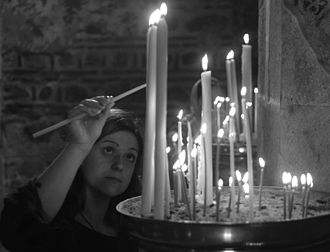
Courtesy of wikipedia.org
He was hunched against the retirement center’s brick wall, his figure illuminated by the light from a single bulb overhead. A hoodie covered most of his face, but by his crouched position, I knew he was young. He was probably one of the homeless in the area, though I’d not seen him before. As I headed to the elevator in my building, I stuffed money into the pocket of my windbreaker, hoping to reach him before a guard shooed him away.
When I was close enough to see his face, he was, as I’d guessed, a boy in his mid-teens, an African American. Near enough for him to hear me, I asked if he was homeless. He nodded.
“There are shelters,” I replied. He shook his head at the suggestion and, having worked with the homeless, I knew why. Shelters could be dangerous places. Hunkering down to sleep under the dense shrubbery of a park is sometimes safer.
We continued to talk for another minute before I handed him the money stowed in my pocket. He accepted it with a nod, then stuffed the bills into his wallet. From a corner of my eye, I saw a young woman headed toward us. Her heels sounded like a crisp tattoo on the pavement. It seemed as if she meant to give me fair warning. If I intended to roust her friend from where he was crouching, she had an objection.
As she drew near, I asked if she was homeless, too. My tone was mollifying, so I was grateful to see her shoulders drop to a relaxed position. She shook her head in answer to my question, time enough for me to note she was long-limbed and that her cap of dark hair framed a pale face with even features. The pair weren’t related, but by her demeanor, I sensed she took a proprietary interest in the boy.
The three of us talked a few moments longer, then, satisfied the youth was in safe hands, I said goodnight. As I walked away, I thought of the man in the fedora hat. “I’ve kept my word,” I said to the darkness.
Many share my concern for the homeless. Walking through my neighborhood, I sometimes see young people assisting them by offering a blanket or an item of warm clothing. What the local authorities think about street charity, I don’t know. Regulations can be surprising. In my city, an ordinance exists that fines individuals of goodwill who drop coins into the slots of lapsed parking meters. Why should a kind impulse be punished, I wonder.
I queried a woman on Facebook about her work with the homeless. Was she part of an organization?
“No,” she replied. “I’m solo. I love Portland‘s generosity and the consistency of many volunteers. They have such heart.” She directed me to a website called Hot Soup as an example. Following the thread, I learned a network of ad hoc volunteers existed throughout the community. Not long ago, a band of them sued the city to prevent their charitable efforts from being shut down.
Having served in public office, I’m not one to see government as the enemy. Democracy isn’t an efficient system, I admit. Tyrannies do better at bending people to their will. Even so, I sometimes feel, the public takes the work of government for granted, often criticizing, seldom praising. On the national level, I despair that people fail to see the obstacles President Joe Biden and his cabinet have removed in efforts to improve the conditions of ordinary people. Donald Trump gave tax cuts to the rich and forced individuals to fend for themselves during the pandemic.
Governments are either good or bad depending upon the wisdom of the citizens who vote. We sometimes forget we are a part of the formula. To blame the government is to point an accusing finger at ourselves.
At the moment, the country can’t agree on the correct questions let alone agree on the answers. Confusion is understandable. We face uncertain times: the economic fallout of a global pandemic, famine, and conflict abroad. But when we focus on personal demands, we distort the national character. Democracy aims to lift all boats. We were united on that principle once. As pioneers, we built a nation one barn-raising at a time. After World War 11, we helped Europe stand on its feet again. Our defense of Ukraine is a remnant of that spirit.
The young people I see patrolling the streets in my city, intent upon taking personal responsibility for the fate of others, also reflect American values. I honor those volunteers. They remind us of a single candle’s power. If one taper can dispel a shadow, a second and a third will dispel more. What is darkness, after all, but a space waiting for light?
